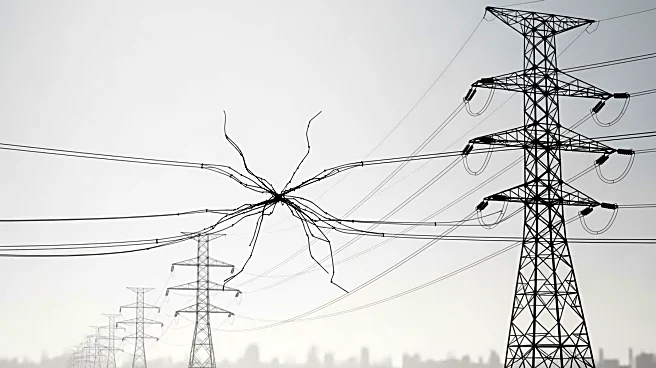What's Happening?
The Dominican Republic experienced a rare and extensive blackout on Tuesday, affecting the entire nation of nearly 11 million people. The blackout was attributed to a failure in the grid's transmission
system, although the exact cause remains unclear. The Dominican Electricity Transmission Company reported that generation units in San Pedro de Macorís and the Quisqueya Power Plant shut down, leading to a cascade of failures across other transmission and generation plants. The blackout disrupted mass transit systems, including aerial cable cars and the metro in Santo Domingo, where passengers had to be evacuated. Hospitals, banks, and other large institutions relied on generators, while many homes and small businesses were left without power. The blackout occurred during the afternoon rush hour, exacerbating traffic chaos in eastern Santo Domingo.
Why It's Important?
The widespread power outage in the Dominican Republic highlights the vulnerabilities in the nation's energy infrastructure, which is primarily fueled by oil, coal, and natural gas, with limited reliance on renewable sources like solar, wind, and hydroelectric power. The blackout underscores the need for improved maintenance and investment in the energy grid to prevent future disruptions. The incident has significant implications for the country's economy, affecting businesses and daily life, and may prompt discussions on energy policy and infrastructure development. The reliance on generators during outages also raises concerns about the environmental impact and sustainability of current energy practices.
What's Next?
Authorities are working to restore power as quickly as possible, with approximately 33% of the national power demand restored by Tuesday evening. The government may need to address the underlying issues in the transmission system to prevent future occurrences. This situation could lead to increased pressure on the government to invest in renewable energy sources and improve grid reliability. Stakeholders, including political leaders and energy companies, may engage in discussions to develop strategies for enhancing the country's energy infrastructure and reducing dependency on fossil fuels.
Beyond the Headlines
The blackout in the Dominican Republic may have broader implications for regional energy cooperation and investment in renewable energy projects. As the country shares the island of Hispaniola with Haiti, there could be opportunities for cross-border energy initiatives to improve grid stability and resilience. The incident also highlights the importance of diversifying energy sources to mitigate the impact of transmission failures and reduce environmental impact.









